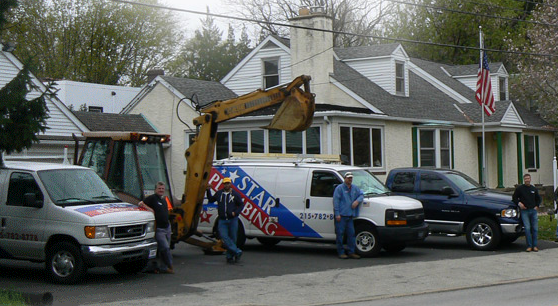Can You Use PVC Glue For Water Lines? A Comprehensive Guide
PVC glue is a type of adhesive that is used to join two pieces of PVC (polyvinyl chloride) pipe together. It is a strong, durable, and water-resistant adhesive that is easy to use and provides a tight seal. PVC glue can be used for both indoor and outdoor applications and can be used for a variety of plumbing projects including water lines. PVC glue can bond most types of PVC pipes including schedule 40, schedule 80, and CPVC. The glue should be applied to the outside of the pipe, allowing the chemicals in the glue to react with the PVC material. Once set, the bond will create an airtight and waterproof seal between the pipes. When using PVC glue for water lines, it’s important to ensure that all surfaces are clean and free of debris before application. Additionally, read all instructions on the packaging carefully to ensure proper application and safe use.
Can You Use PVC Glue For Water Lines?
Plumbing is an important part of a home, and it is essential to get the job done right. One way to ensure that a plumbing job is done properly is to use PVC glue for water lines. PVC glue is a type of adhesive specifically designed for use with PVC pipes, and it can provide a strong bond that will last for years. In this article, we will discuss the benefits and disadvantages of using PVC glue for water lines, as well as provide instructions on how to properly use this type of glue.
Types of PVC Glues
There are several types of PVC glues available on the market today. The most common types are purple, blue, and white glues. Purple glue is designed for pressure applications and has an extra-long open time for easier installation. Blue glue is ideal for non-pressure applications such as gutter systems or pool liners. White glue has a fast set time and can be used in both pressure and non-pressure applications.
Instructions For Using PVC Glue
When using any type of PVC glue, it’s important to follow the manufacturer’s instructions carefully. First, clean the area where the pipe will be installed with rubbing alcohol or an approved cleaner and let it dry completely before gluing. Next, apply the glue evenly around the pipe’s circumference using a brush or spatula, making sure not to get any excess on your skin or clothing. Allow the joint to set for about ten minutes before inserting it into place in order to ensure that the bond holds properly once assembled. Finally, firmly press the joint together using a rubber mallet or hammer if needed until it’s seated all the way into place and allow it to cure overnight before testing with water pressure.
Benefits Of Using PVC Glue For Water Lines
PVC glue offers many advantages when used in plumbing applications, making it an ideal choice for homeowners looking to do their own repairs or installations. Its resistance to heat and pressure makes it ideal for long-term use in hot climates, while its waterproof bonding capabilities make it great for outdoor installations such as irrigation systems or pool liners. Additionally, its ability to form strong bonds makes it suitable for both indoor and outdoor applications since there’s no need to worry about leakage or corrosion due to temperature changes or exposure to elements like rainwater or sunlight over time.
Disadvantages Of Using PVC Glue For Water Lines
Although there are many advantages associated with using PVC glue in plumbing jobs, there are also some potential drawbacks that should be taken into consideration before making your decision whether or not this type of adhesive is right for you. The most notable disadvantage is its flammable properties which make it dangerous when inhaled or swallowed so proper safety precautions must always be taken when working with this material such as wearing protective gear like gloves and goggles at all times during installation process . Additionally, if not applied properly according to manufacturer’s instructions then bond may not hold up over time so make sure that you have followed directions exactly when doing any kind of repair job involving these types of adhesives
Can You Use PVC Glue For Water Lines?
PVC glue is a versatile and reliable adhesive that can be used for a variety of applications, including water lines. PVC glue is designed to securely bond PVC pipes and fittings together without the need for additional fasteners such as screws or bolts. It is ideal for plumbing projects as it can create a permanent seal, ensuring a tight and long-lasting connection between the pipes. In this article, we will take a look at the basics of working with PVC pipe and fittings, as well as tips for successfully gluing PVC pipe.
Basics Of Working With PVC Pipe And Fittings
When working with PVC pipe and fittings, there are several types of fittings available. The type of fitting you choose will depend on the size and shape of your piping project. It is important to measure carefully to ensure that you choose the right size fitting for your particular application. If you are unsure which type of fitting to use, you can consult your local hardware store or plumbing supply store for advice.
Once you have chosen the right fittings for your project, it is essential that you cut the pipes cleanly and accurately in order to ensure a tight fit when gluing them together. You can use either a hand saw or an electric saw to make your cuts; however, an electric saw will provide more precise cuts than a hand saw would. Make sure that you measure twice before cutting so that you get accurate results every time.
After cutting your pipe to size, it’s important to clean and prep the materials before gluing them together. This will help ensure that there are no debris or contaminants on the surfaces that could prevent the glue from forming an adequate bond between the pieces. To do this, use sandpaper or steel wool to lightly sand down any rough edges on both sides of each piece before applying any glue. This step should be done carefully in order to avoid damaging either piece in any way during the process.
Tips For Successfully Gluing PVC Pipe
When using PVC glue on water lines, it is important to make sure that you balance the viscosity levels properly in order to get an airtight seal without any gaps or leaks in between pieces of pipe.. To do this correctly, mix equal parts of both components (the resin and catalyst) together until they reach an even consistency before applying it onto one side of each piece being connected by using either a brush or rag.. Once applied onto both pieces evenly, join them quickly so that they don’t have time to dry out before being connected.. Make sure that there is tension between both pieces when joining them together so that they fit snugly into place..
It’s also important to remember safety measures when working with PVC glue because it is highly flammable and has noxious fumes.. Make sure that rooms are well ventilated when working with this type of adhesive so fumes don’t build up indoors.. Additionally, always read labels carefully for proper disposal methods after use because some types may require special handling.. Lastly, avoid skin contact as much as possible by wearing rubber gloves during application process..
Overall gluing PVC pipes into place using PVC glue can be done easily if done correctly.. Following these steps will help ensure successful results every time while also keeping safety in mind at all times..
FAQ & Answers
Q: What types of PVC glues are available?
A: There are two types of PVC glue available: solvent-based and non-solvent based. Solvent-based PVC glue is the most common type and is used for gluing together plastic pipes and fittings. Non-solvent based PVC glue is a two-part system that must be mixed before use and provides an extremely strong bond.
Q: What instructions should be followed when using PVC glue?
A: When using PVC glue, always follow the instructions on the product label carefully. Make sure to wear protective gloves and eyewear, as the fumes released can be harmful to your health. Ensure that the surfaces being glued together are clean, dry, and free of debris before applying the glue.
Q: What are the benefits of using PVC glue for water lines?
A: The main benefits of using PVC glue for water lines include its resistance to heat and pressure, its waterproof bonding capabilities, and its suitability for both indoor and outdoor applications.
Q: What are the disadvantages of using PVC glue for water lines?
A: The main disadvantages of using PVC glue for water lines include its flammable properties, potential danger when inhaled or swallowed, and complications with temperature exposures.
Q: What basics should be known about working with PVC pipe and fittings?
A: Some basics that should be known about working with PVC pipe and fittings include knowing what types of fittings are available, how to cut the pipe cleanly and accurately, how to clean and prep the materials before gluing them together, and tips for successfully gluing them together.
In conclusion, PVC glue can be used for water lines but it is not always the best choice. PVC glue is best used for small temporary repairs and should not be used in a permanent installation. It can be difficult to remove once it has been applied. When selecting the right material for water lines, it is important to consider the type of pipe being used and the environment in which it will be installed. Professional plumbers may have additional advice regarding what type of glue or joint compound to use depending on the specific application.
Author Profile

-
Star Plumbing, located in Elkins Park, PA, is a full-service plumbing company owned and operated by Mitchell Gordon. Since its inception, Star Plumbing has been providing its customers with reliable, quality plumbing services.
The Star Plumbing website offers informative articles on DIY plumbing and plumbing equipment, offering readers helpful advice and tips on how to take care of their own plumbing needs. This is a great resource for those who are looking to tackle a plumbing project themselves, as it provides useful information and advice on how to safely and successfully complete a plumbing job. Additionally, the website provides detailed descriptions of the various plumbing tools and equipment that are available, as well as detailed instructions on how to use them.
Star Plumbing’s website is a great resource for anyone with plumbing needs. Whether a customer is looking for advice on how to take care of their own plumbing or to schedule service from Star Plumbing, the website offers helpful advice and information for all their plumbing needs.
Latest entries
- April 12, 2024Plumbing Equipment And AccesoriesI Tested And Ranked The Best 10 Inch Rough In Round Toilet: And Here’s What I Found
- April 12, 2024Plumbing Equipment And AccesoriesI Tested And Ranked The Best Stone That Cleans Toilets: And Here’s What I Found
- April 12, 2024Plumbing Equipment And AccesoriesI Tested And Ranked The Best Heat Tape For Plumbing: And Here’s What I Found
- April 12, 2024Plumbing Equipment And AccesoriesI Tested And Ranked The Best Kaboom Toilet Bowl Tablets: And Here’s What I Found
